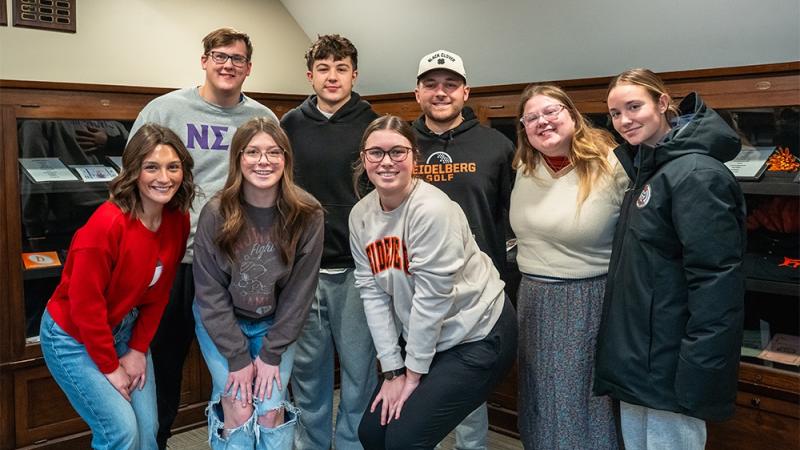Roxana Saberi: CBS reporter talks captivity, career
Roxana Saberi, foreign correspondent for CBS News, has an immense amount of knowledge on dealing with conflict in a work environment, as well as how to transition into life after college. She shared her experiences and wisdom with Heidelberg students as the final HYPE Career Ready speaker this academic year.
Saberi has traveled the world, covering a wide range of topics from protests to plastic pollution. Many of her assignments were in the Middle East. There are many risks when reporting some events, one specific trip suddenly became frightening due to a false accusation.
Oh the places you’ll go
Being an international reporter means lots of travel with lots of different topics to cover. Saberi was based with CBS in London for just over three years. Through CBS Saberi has frequently traveled throughout the Middle East and Europe. In Greece, she covered a story on the refugee crisis, then in Baghdad she covered the topic of the security situation. Saberi has even traveled all the way to Antarctica to cover how climate change is affecting the penguin population. Saberi has been to Sweden to cover a story about environmental activist Greta Thunberg, along with the trial of ASAP Rocky the rapper. One of Saberi’s personal favorite stories to cover was the Women’s World Cup soccer tournament in France, which the U.S. team won.
“While the job can be very fun, it can also have its less glamorous sides. We often set up shop in the corner of hotel rooms and sleep whenever we can,” says Saberi, showing a photo of herself curled up on the seat of a train.
“Despite the challenges, it's been a real privilege to work in a profession that is often writing the first rough draft of history."
Saberi started her journey to becoming a news reporter in North Dakota. Growing up, she longed to travel beyond the borders of her home state. However, when going off to college, Saberi mentioned that she didn’t travel too far, only going to Minnesota to Concordia College. When she got there, she was unsure of what she wanted to study. Saberi’s extracurricular activities were writing for the campus TV program and newspaper and those activities really helped her notice her passion for all things news. Thus, she decided to study mass communications and French. Her dream was to become a foreign news correspondent.
However, before becoming a news correspondent, Saberi actually became Miss North Dakota, which she says was not planned. Nevertheless, she said that her experience of traveling to schools and organizations was great and it also allowed her to go to grad school at Northwestern University, where scholarships allowed her to pursue her journalism degree. Saberi got a master’s degree in international relations at the University of Cambridge and got a Master’s degree in international relations. With her sights set on becoming an international news correspondent, Saberi got her big break when a mentor introduced her to the founder of a D.C.- based news Agency that provides TV and radio stories to news organizations around the world. Saberi offered to set up a bureau in Tehran and he agreed. “My heart was telling me to go,” says Saberi.
Taken prisoner
Saberi was overseas in Tehran, the capital of Iran, reporting for CBS News and about to return home. A protest had broken out at the University of Tehran because those at the university were opposed to the government privatizing universities. It wasn’t long before the “protests spilled into the streets and people were calling for more social and political freedoms,” says Saberi.
Saberi, along with other journalists, was reporting on the issue when Iranian military soldiers armed with weapons such as chains, clubs and knives, showed up and began beating and detaining the protesters. Being not only a woman but a journalist, she was in more danger than she had ever thought.
Saberi was about ready to leave the country, when her worst possible nightmare came to life. On January 1, 2009, four intelligence agents forced their way into his apartment, accused her of being a spy for the CIA, arrested her, and took her to a prison. It was the same prison in which another female journalist had died and other political prisoners were held. “I had heard of accounts of executions, torture and disappearances that had taken place there,” says Saberi
She was marched to a solitary confinement cell that was so small her wingspan almost touched wall to wall. There was no bed, so she was forced to sleep on the ground with only a blanket between her and the hard cement floor covered by the thinnest carpet. A small window was placed above the door near the ceiling but it was covered in metal mesh which prohibited any natural light from entering. A single lightbulb was on 24/7, and while there was a toilet in the cell, it didn’t work.
Not only were Saberi’s needs stripped away, but her rights to have a phone call, to have an attorney, to be free from torture both physically and mentally, and to be innocent until proven guilty were also all stripped away.
“My captors told me I could not have an attorney, I could not have a phone call because I was a threat to national security,” reflects Saberi.
She was not allowed paper and pen or even a book, she was totally cut off from the outside world. “I felt very alone,” she says.
To get through the day she found herself praying constantly. Early on, she had a hard time coping. She wished she was able to turn back time and leave sooner so that she never would have not been arrested. She was put through intense interrogations day after day. The false accusations ranged from having classified documents to say that the CIA was paying her to interview people. In reality, she was interviewing Iranian people for the purpose of a book she was writing.
Saberi’s captors told her that they would quickly release her if she admitted to her wrongdoings and that she would then have to spy for them. Saberi then made a false statement but after she felt guilty. “Instead of being happy, I was ashamed I knew that one day though my body would be free, my consciousness would always remain behind bars.”
After she was moved to a larger cell with other women, they too were pressured into making false statements. When hearing, this Saberi decided to repeal her statement. The head interrogator then told her that they knew she was falsely accused but they were still able to take her to court and sentence her to eight years. However, people outside were starting to figure out where Saberi was. A trial was held and she was freed the next day. The battle however was not over for Saberi. She had to process a mass amount of emotions. Upon working through those she came out stronger and through the trials and tribulations, Saberi was able to regain her voice and is proof that there are difficult times but you can always rise up.
Story by Bailey Walter, '23




